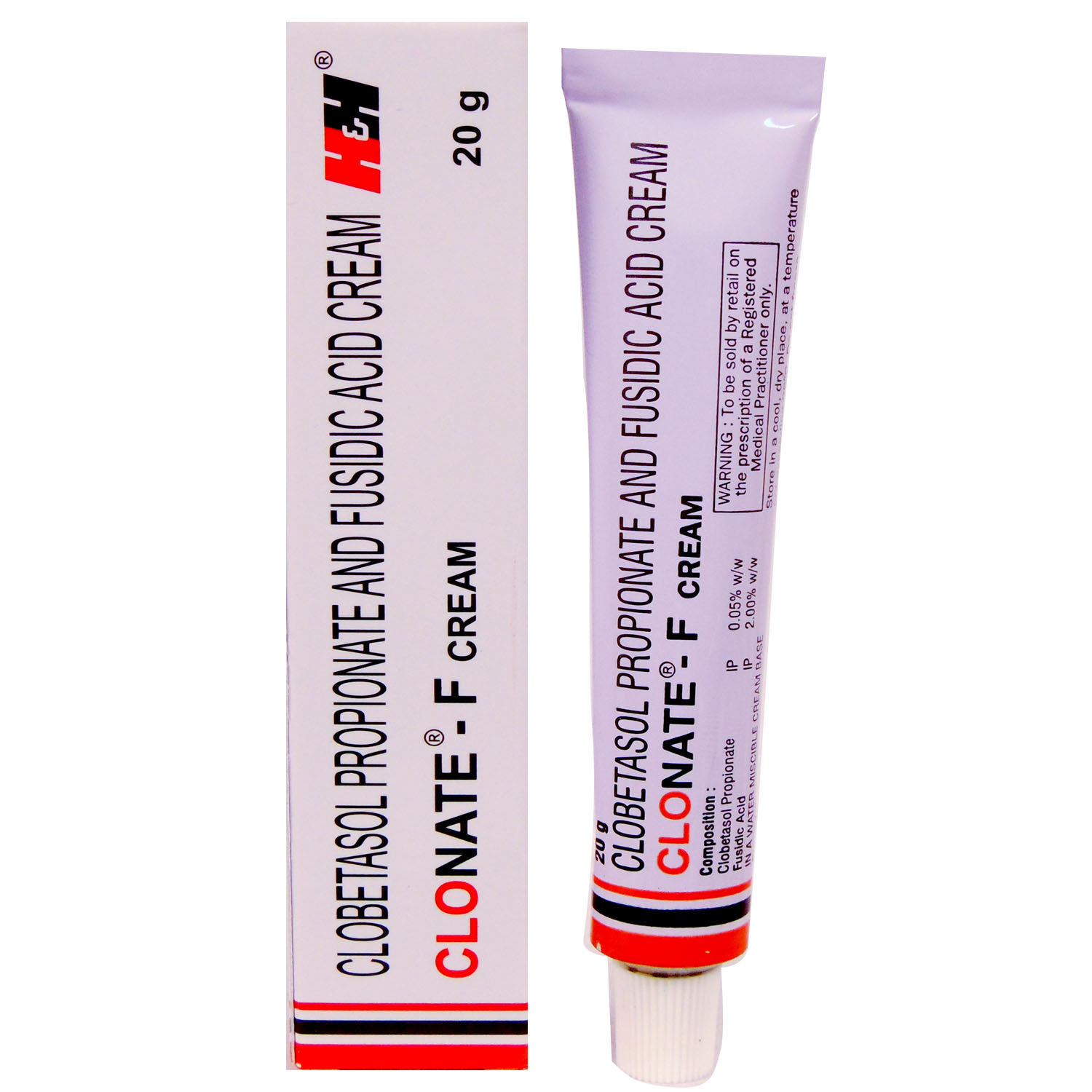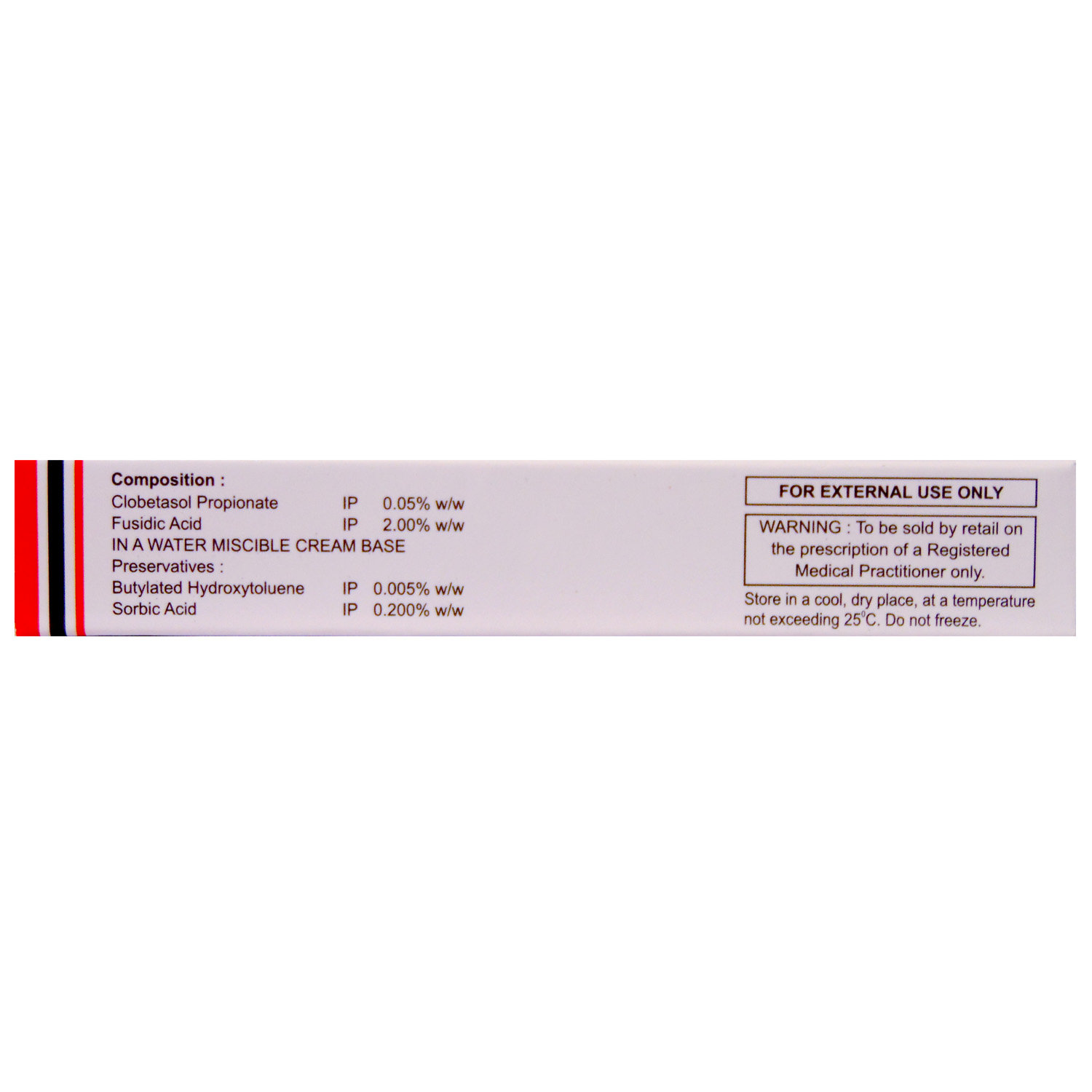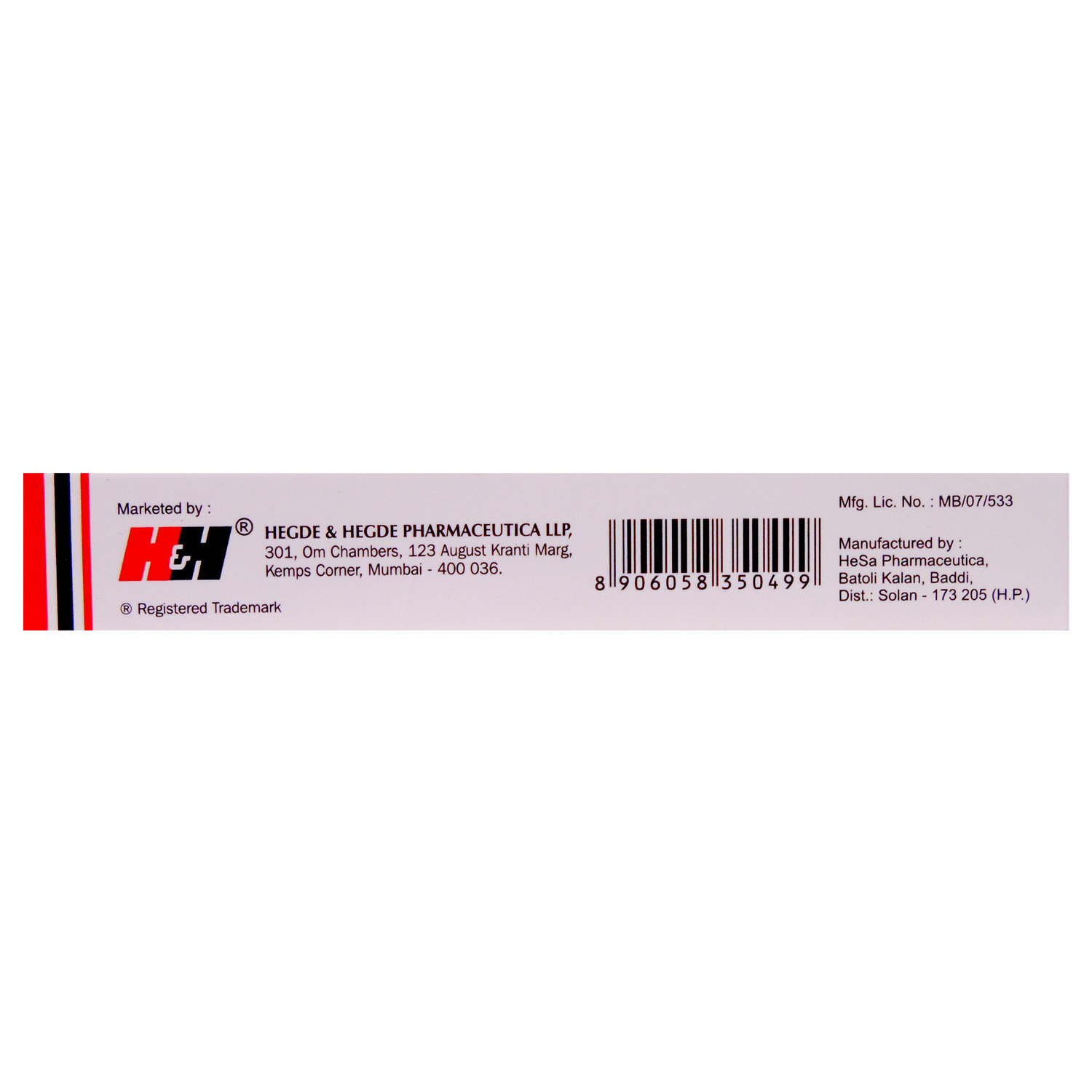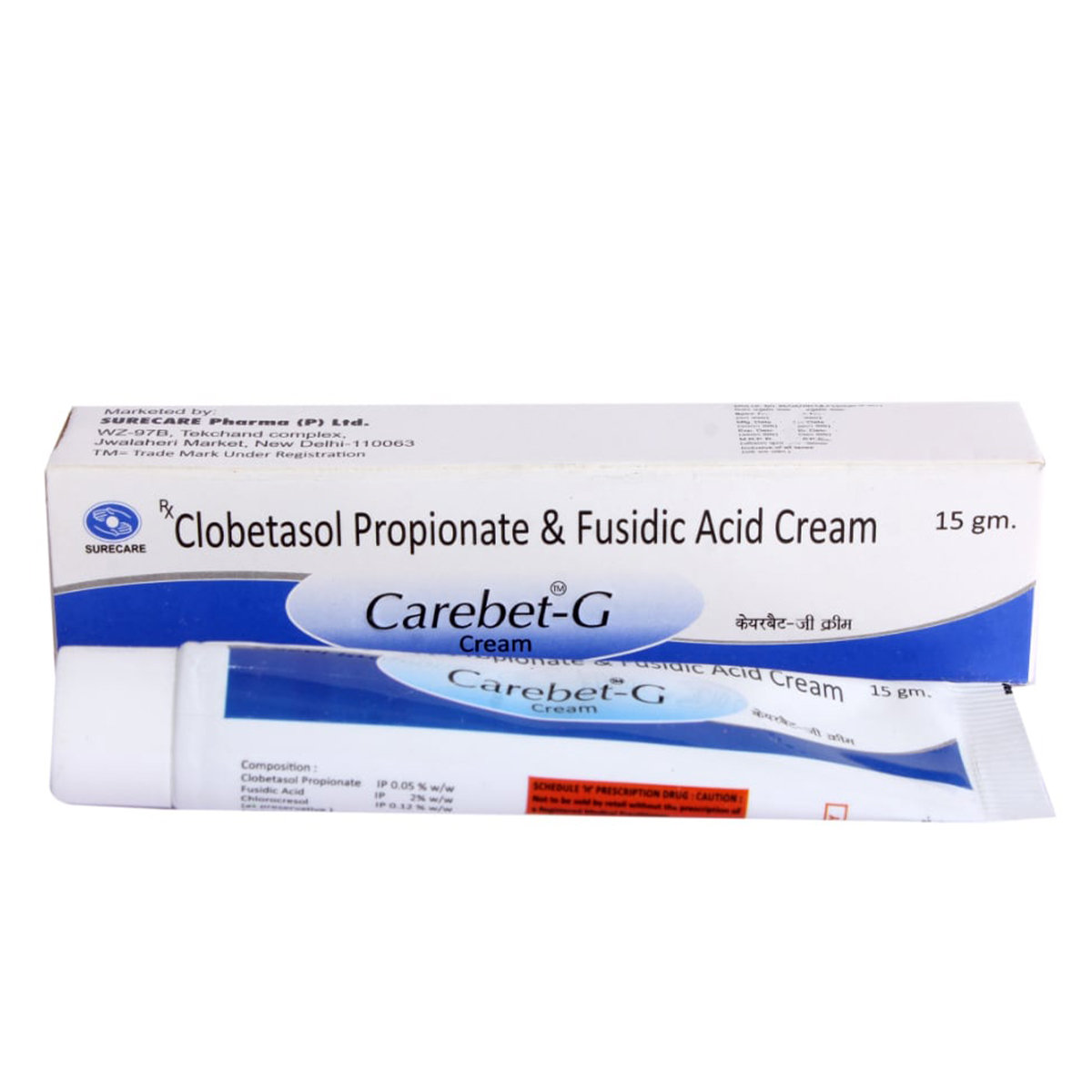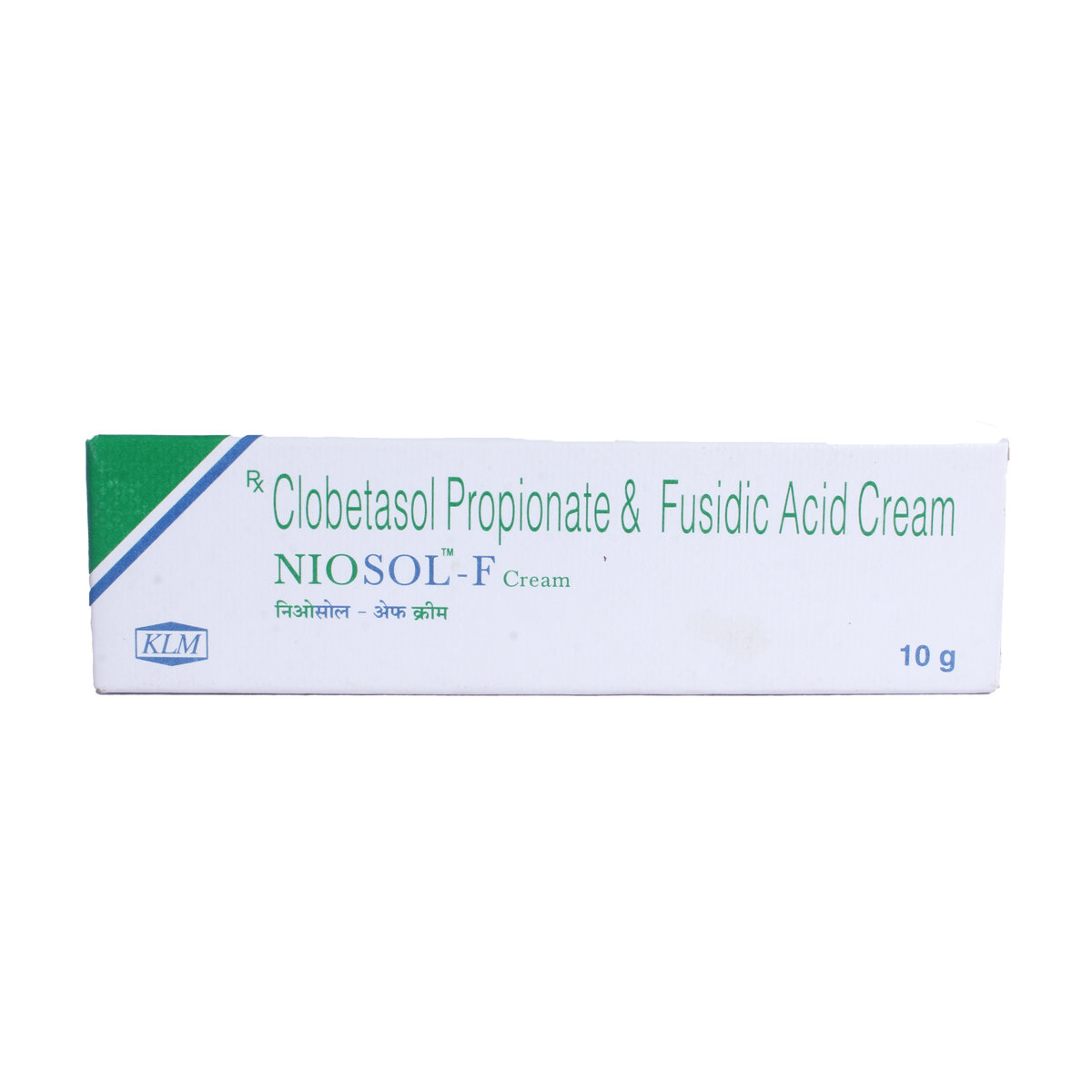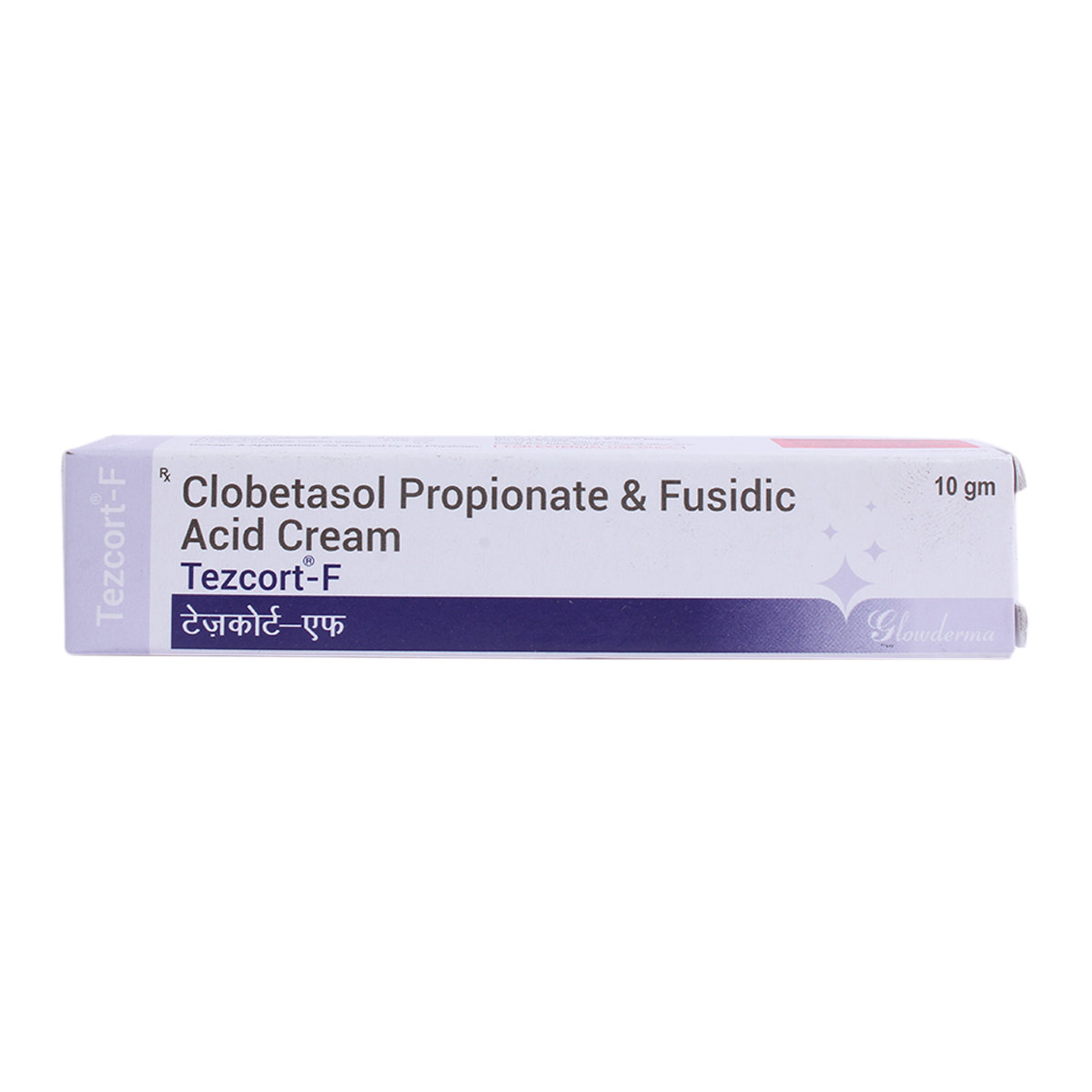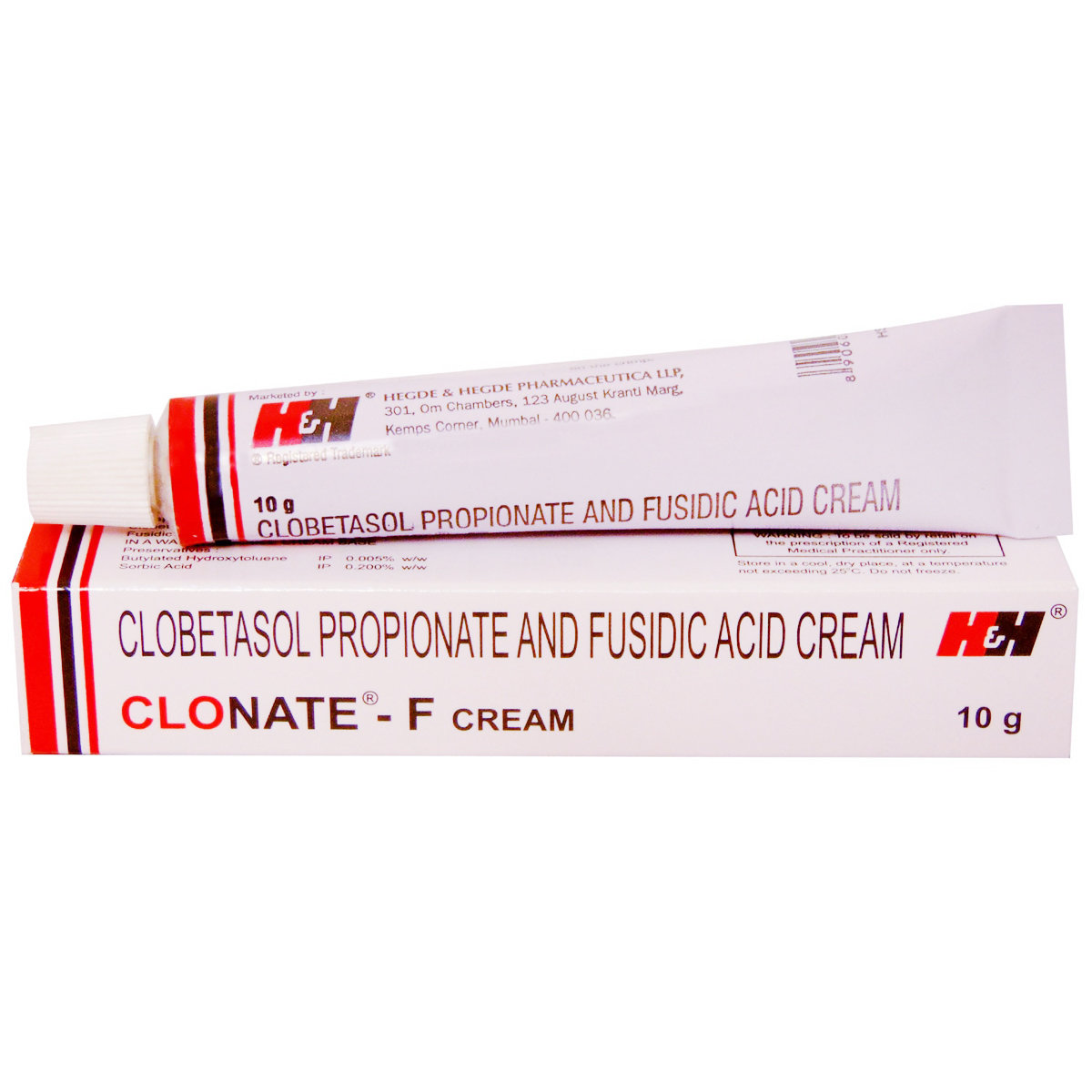Clonate-F Cream 20 gm
MRP ₹342
(Inclusive of all Taxes)
₹51.3 Cashback (15%)
Selected Pack Size:20 gm
20 gm ₹307.8
(₹15.39 per gm)
In Stock
10 gm ₹184.5
(₹18.45 per gm)
In Stock
Provide Delivery Location
Online payment accepted
 Prescription drug
Prescription drugWhats That
Composition :
Manufacturer/Marketer :
Consume Type :
Expires on or after :
Return Policy :
About Clonate-F Cream
Clonate-F Cream belongs to the class of dermatological medication used to reduce swelling, itching, and redness caused due to bacterial skin infections. Bacterial infection is a condition in which harmful bacteria grow in the body and cause infection. It can infect any part of the body and multiply very quickly.
Clonate-F Cream contains Clobetasol (corticosteroids) and Fusidic acid (antibiotic). Clobetasol works by acting inside skin cells and inhibits the release of certain chemical messengers in the body that cause redness, itching, and swelling. When the skin reacts to any allergens, such chemicals are released normally. Fusidic acid is an antibiotic that works by inhibiting the production of essential proteins that are necessary for bacteria to grow, multiply and increase in numbers. Thereby, it stops the growth of bacteria without killing them directly. Then the bacteria eventually die, or the immune system destroys them and clears the infection.
Clonate-F Cream is only for external use. Take a small amount of Clonate-F Cream on the finger and apply it as a thin layer on the clean and dry affected area. Avoid contact of Clonate-F Cream with nose, ears, mouth, or eyes. In case Clonate-F Cream comes in contact with these areas accidentally, rinse with water thoroughly. Your doctor will advise you on how often you use Clonate-F Cream based on your medical condition. In some cases, you may experience pain, itching, irritation, or burning sensation at the site of application. Most of these side effects of Clonate-F Cream do not require medical attention and gradually resolve over time. However, if the side effects persist or worsen, please consult your doctor.
If you are known to be allergic to Clonate-F Cream or any other medicines, please tell your doctor. Do not wrap or cover the treated area with bandages unless advised by your doctor. Avoid smoking or going near naked flames as the fabric (bedding, clothing, dressings) that is in contact with Clonate-F Cream catches fire and burns easily, which is a serious fire hazard. If you are pregnant or breastfeeding, please inform your doctor before taking Clonate-F Cream. Avoid using Clonate-F Cream for more than 5 days in children and on the face. Do not apply Clonate-F Cream in large amounts or use for a long time than prescribed as it does not give quick or better results but increases the risk of side effects and makes skin more sensitive to Clonate-F Cream. If you have rosacea (redness and often red, small, pus-filled bumps on the face) or acne, please inform your doctor before taking Clonate-F Cream.
Uses of Clonate-F Cream
Directions for Use
Key Benefits
Clonate-F Cream is a combination of two drugs, namely Clobetasol and Fusidic acid. Clonate-F Cream is used to reduce swelling, itching, and redness caused due to bacterial skin infections. Clobetasol is a corticosteroid that acts inside skin cells and inhibits the release of certain chemical messengers in the body that cause redness, itching, and swelling. When the skin reacts to any allergens, such chemicals are released normally. Fusidic acid is a narrow-spectrum antibiotic that mainly acts against gram-positive bacteria. It inhibits the production of essential proteins that are necessary for bacteria to grow, multiply and increase in numbers. Thereby, it stops the growth of bacteria without killing them directly. Then the bacteria eventually die, or the immune system destroys them and clears the infection.
Storage
- Avoid extreme heat or cold, like hot showers or cold winds, to prevent worsening skin discomfort.
- Cool compresses: To reduce itch, redness, and swelling.
- Avoid irritants like harsh chemicals or allergens to prevent worsening skin discomfort.
- If you have severe itching, burning, or blistering seek medical attention.
- Keep your skin clean by gently washing your face two times daily and after sweating. Choose a mild and non-abrasive cleanser.
- Use gentle alcohol-free skin care products. Avoid products that might irritate your skin such as exfoliants, astringents and toners.
- Acne may also occur due to oil in the hair. Thus, if you have oily hair, shampoo more frequently than you do now and keep your hair away from face.
- Keep your hands off your face as touching face throughout the day might worsen acne. Also, do not pick, squeeze or pop acne as it will prolong the healing process and increase the risk of dark spots and scarring.
- Avoid tanning by applying a broad spectrum sunscreen and wearing sun-protective clothing when outdoors.
- Mild hair follicle inflammation often heals on its own without needing treatment.
- You can apply a warm saltwater or vinegar solution to the affected area with a washcloth, or use over-the-counter antibiotics, oatmeal lotion, or hydrocortisone cream for relief.
- Avoid making the affected area worse by not shaving, scratching, or wearing tight clothes.
- Apply a warm compress to the area 3-4 times a day for 15-20 minutes to help speed up healing.
- Do not scratch, squeeze, or pop any bumps, as this may lead to infection or other problems.
- If self-care methods fail, consult a doctor for further treatment and advice.
- Shield your skin from the sun by using sunscreen, seeking shade, and wearing protective clothing.
- Please don't smoke, as it damages the skin and reduces blood flow.
- Treat your skin gently by limiting bath time, using mild cleansers, and shaving carefully.
- Eat a healthy diet of fruits, vegetables, whole grains, and lean proteins.
- Stay hydrated by drinking plenty of water.
- Manage stress through sleep, exercise, meditation, and enjoyable activities.
- Additionally, use moisturizers to coat your skin with a protective barrier, and consider wearing sun-protective clothing.
- Apply moisturizer immediately after showering or bathing.
- Use a moisturizer containing lanolin, petroleum jelly, glycerine, hyaluronic acid or jojoba oil.
- Do not use hot water for bathing. Instead use warm water and limit showers and bath to 5 to 10 minutes.
- Apply a sunscreen with SPF-30 or higher.
- Avoid harsh soaps, detergents and perfumes.
- Do not scratch or rub the skin.
- Drink adequate water to prevent dehydration.
- Wear pants, full sleeves and a wide-brimmed hat while going out in the sun.
Drug Warnings
Do not wrap or cover the treated area with bandages unless advised by your doctor. If you are known to be allergic to Clonate-F Cream or any other medicines, please tell your doctor. Avoid smoking or going near naked flames as the fabric (bedding, clothing, dressings) that is in contact with Clonate-F Cream catches fire and burns easily, which is a serious fire hazard. If you are pregnant or breastfeeding, please inform your doctor before taking Clonate-F Cream. Avoid using Clonate-F Cream for more than 5 days in children and on the face. Do not apply Clonate-F Cream in large amounts or use for a long time than prescribed as it does not give quick or better results but increases the risk of side effects and makes skin more sensitive to Clonate-F Cream. If you have rosacea (redness and often red, small, pus-filled bumps on the face) or acne, please inform your doctor before taking Clonate-F Cream.
Drug-Drug Interactions
Drug-Drug Interactions
Login/Sign Up
Drug-Food Interactions
Drug-Food Interactions
Login/Sign Up
Diet & Lifestyle Advise
- Eat foods rich in quercetin (a flavonoid) such as apples, cherry, broccoli, spinach and blueberries.
- Consuming food rich in probiotics helps in developing the immune system against allergies.
- Limit intake of food that might trigger allergies such as dairy products, soy, eggs, and nuts.
- Avoid consumption of foods with excess sugar as it may flare-up inflammation.
- Include fruits, vegetables, whole grains, healthy fats and fish in your diet.
- Avoiding getting in contact with harsh soaps, detergents and rough fabrics.
Side Effects of Clonate-F Cream
- Pain
- Itching, irritation or burning sensation at the site of application.
Habit Forming
Therapeutic Class
All Substitutes & Brand Comparisons
RX
Clopic-F Cream 15 gm
Atopic laboratories Pvt Ltd
₹154.5
(₹9.27/ 1gm)
39% CHEAPERRX
Out of StockDicfu-C Cream
Nidus Pharma Pvt Ltd
₹105
(₹9.45/ 1gm)
38% CHEAPERRX
Paedisone F Cream 15 gm
Praise Pharma
₹173
(₹10.38/ 1gm)
32% CHEAPER
Author Details
We provide you with authentic, trustworthy and relevant information
Drug-Diseases Interactions
Drug-Diseases Interactions
Login/Sign Up
FAQs
Drug-Drug Interactions Checker List
- ITRACONAZOLE
- RITONAVIR
Special Advise
- Avoid smoking or going near naked flames as the fabric (bedding, clothing, dressings) that is in contact with Clonate-F Cream catches fire and burns easily, which is a serious fire hazard.
- Avoid contact of Clonate-F Cream with nose, ears, mouth or eyes. In case Clonate-F Cream comes in contact with these areas accidentally, rinse with water thoroughly.
Disease/Condition Glossary
Bacterial infection: It is a condition in which harmful bacteria grow in the body and cause infection. It can target any part of the body and multiply very quickly. Bacteria come in three basic shapes, namely spherical, rod, or spiral-shaped. Bacteria may be gram-positive (have thick cell walls) or gram-negative (do not have cell walls). Appropriate tests are done to identify bacterial strains, and based on the results, proper medication is prescribed. Some common symptoms of bacterial infection include cough, fever, and tiredness.

Have a query?
Alcohol
Safe if prescribed
Interaction of Clonate-F Cream with alcohol is unknown. Please consult a doctor before consuming alcohol while using Clonate-F Cream.
Pregnancy
Consult your doctor
The safety of Clonate-F Cream in pregnant women is unknown. Therefore, it is given to pregnant women only if the doctor thinks benefits outweigh risks.
Breast Feeding
Consult your doctor
Do not apply Clonate-F Cream on the breast area. Clonate-F Cream is given to breastfeeding mothers only if the doctor thinks benefits are greater than risks.
Driving
Safe if prescribed
Clonate-F Cream usually does not affect your ability to drive or operate machinery.
Liver
Consult your doctor
If you have any concerns regarding the use of Clonate-F Cream in patients with Liver problems, please consult a doctor.
Kidney
Consult your doctor
If you have any concerns regarding the use of Clonate-F Cream in patients with Kidney problems, please consult a doctor.
Children
Safe if prescribed
Clonate-F Cream should be used with caution in children if prescribed by a doctor.

